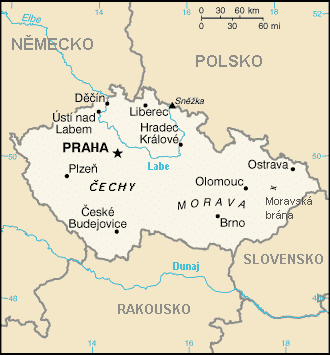2.8 – Kde bydlíte? Kde žijete? – Talking about Where You Live and the Locative Case
In this lesson we will learn how to answer the question Kde bydlíte? Kde žijete? – Where do you live? This question uses the words kde – where and bydlet – ‘to live, reside’ or žít ‘to live’[1]. The verb bydlet is conjugated as follows:
bydlet ‘to live, reside’
|
(já) |
bydlím ‘I live, am living’ |
(my) |
bydlíme we live, are living’ |
|
(ty) |
bydlíš ‘you live, are living’ |
(vy) |
bydlíte ‘you live, are living’ |
|
(on/ona/ono) |
bydlí ‘he/she lives, is living’ |
(oni/ony/ona) |
bydlí ‘they live, are living’ |
žít; stem = žij- ‘to live’
|
(já) |
žiju ‘I live’ |
(my) |
žijeme ‘we live’ |
|
(ty) |
žiješ ‘you live’ |
(vy) |
žijete ‘you all live’
‘you (formal) live’ |
|
(on/ona/ono) |
žije ‘he/she/it lives’ |
(oni/ony/ona) |
žijou ‘they live’ |
Now, when we want to say where we live, we have to use words meaning at, in, etc. We’ll need the words v ‘in, at’ and na ‘on, at’. Most of the time we will be using v ‘in, at’, but na ‘on, at’ comes up frequently too.
After the forms v and na, we’ll need forms of the so-called Locative case. While there will be some brief rules below, we will wait until later (4.1 – Review of Locative forms for Places, 8.3 – Locative singular and 8.3 – Prepositions v and na) to get the entire picture. Instead you will get a brief version so that we can talk about where we live and people that we know live through a few memorized phrases/forms. Don’t worry too much about memorizing all the endings now. This is more for us to be able to understand why the forms are changing and be aware that these forms exist.
|
Bydlím v Austinu. I live in Austin.
Tomáš žije v Brně. Tomáš lives in Brno. |
Bedřich bydlí v bytě. Bedřich lives in an apartment.
Lucie bydlí na koleji. Lucie lives in a dorm. |
Here are the endings:
(Note – a map of the Czech Republic has been included below in case you are unfamiliar with some of the Czech cities).
|
|
MA |
MI |
F |
N |
|
Hard stem |
We won’t worry about masculine animate forms right now, since they won’t be relevant for locations we might live at. |
-u (most common) -e/ě
Austin – v Austinu Texas – v Texasu Londýn – v Londýně |
-e/ě
Praha – v Praze Ostrava – v Ostravě Arizona – v Arizoně
If the ending is -e/ě, the following consonant shifts take place: k → c h → z (v Praze) ch → š |
-u -e/ě
Mexiko – v Mexiku Brno – v Brně
|
|
Soft stem |
-i
Liberec – v Liberci |
-i
Francie (France) – ve Francii Itálie (Italy) – v Itálii Olomouc – v Olomouci Plzeň – v Plzni (fleeting -e-) |
-i
very few cities end in -e (neuter places like letiště, pole), so no good example for where you live
-í Ústí nad Labem – v Ústí nad Labem |
Images used in this document come from these sources.
[1] both bydlet ‘to live, reside’, žít ‘to live’ can also be used to talk about where you live, though žít can also is used to talk about living your life or even how you are doing, i.e. Jak žiješ? ‘How are you doing (lit. living)?’
